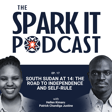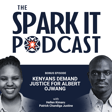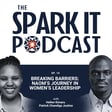Introduction and Guest Introduction
00:00:00
Speaker
Welcome to the Spark It podcast, where we bring you inspiring conversations that actually spark your interest to do more. I'm your host, Kimaru, and today I'm joined by the brilliant, the sassy, the fashionable Kimzi. She's my sister. We had her in our previous conversation. Kimzi, welcome to the podcast. um Thank you so much, Elena, baby.
00:00:21
Speaker
I missed that name. Hi, Patrick. Oh, it's Kimaru, baby. Oh, Kimaru, baby. yeah So I'm delighted to be here today. Thank you so much for hosting me again. It's really amazing to be here today.
00:00:36
Speaker
that's That's exciting. Honestly, thank you for gracing these podcasts once more.
Introduction to 'Echoes of War'
00:00:41
Speaker
And today we are going to dive into into a topic that has had a lot of Kenyans talking today. That is Echoes of War and what artistic freedom means or what artistic freedom has meant either for us because we've been artists for the longest, honestly.
00:00:57
Speaker
so ah Echoes of War is a play that has been trending in Kenya for the last couple of days. Could you tell us a little bit more ah about Echoes of War?
00:01:07
Speaker
Yeah, sure, yeah. So first of all, I'm really, really, I feel mad today because of the things that are happening. So with the echoes of war, it's ah as as she mentioned, it's a play that was supposed to be performed by Butere Girls.
00:01:20
Speaker
So the Butere Girls is a national school in Kenya.
Themes and Impact of the Play
00:01:23
Speaker
They had this play written by one... of the greatest script writers that I know. and Yeah, that is k Cleopa Malala, correct? Yeah, so he did ah the play, ah scripted the play. And I'm going to read the synopsis of the Echoes of War because it's ah it's a really, really... um um great play for me. yeah So the Snopsy says there there exists a natural balance between respect for the old and care for the young.
00:01:52
Speaker
Those who are old bring experience while those who are young bring en thisia enthusiasm and creative innovative innovations. yeah This is a relationship that weaves together our ever evolving society.
00:02:05
Speaker
In this play, this this play is a hyperbole attempt to illustrate the unwinding gap between two generations, that's the old and the young. The artistic context is set in the um Royal Velvet and Emirates, a fictitious kingdom in the Middle East.
00:02:24
Speaker
In this kingdom, the old have quickly lost trust of the younger younger generation and the young are agitated by the inflexible ast strictness of the old.
00:02:37
Speaker
The balance is an inevitable compromise Yes. That is the synopsis. So again, there is um ah um um in there's an imbalance between, there's that gap, yeah? Let me just, the gap between the old generation and the young.
00:02:55
Speaker
And I feel like from this play, it's just, Malala was trying to just ah bring, give a face to what we're facing at the moment in Kenya from, last year. yeah So it's just a scripted art or to express yes yeah oh the realities they are true.
Art and Society: Reflecting Issues
00:03:14
Speaker
It's like they say art mirrors the society. In Kiswahili it's like... um kiocha yeah ah Yes, art ni kiocha jami. That's how we say it in Kiswahili. yeah so For example, for you growing up, you were actually so very much involved.
00:03:31
Speaker
ah in drama festivals, in Kenya music festivals, like could you explain to our viewers how that works, especially as a student, like especially for in terms of levels?
00:03:43
Speaker
So when when growing up, we used to have um from the levels, personally I was in a municipal school year, so that was the most the lowest level ah starting point here, the starting point. So you will start from the municipal, go to the district, street from the district district you go to the provincial, from provincial you go to the nationals, and then if you pass all the stages after the nationals, if your art is picked, now you have to perform to the state house, and you know, and then in front of the president, in front of the president and that play, if it's a play or a poem, it was now publicized for the
00:04:19
Speaker
For the society to see and feel that. Yeah. So that is what was happening. And I believe it's the same thing now. Yeah. Yeah. So they keep going through the same levels. And for you to get there, it means that your context or the whatever you're presenting is top notch.
00:04:36
Speaker
So, for example, and how have you seen like young people or students maybe use GATA? to process or challenge what's happening around them. and Especially in in your context, you could give an example.
00:04:47
Speaker
Because at some point you even wrote a whole play. but Yeah, true, true. yeah Yeah, I did write a whole play and we also performed until the finals. So I feel like it's it's an of having gone through theater, it's ah it's ah the best or the easiest way to convey information or the best way to bring out matters that are affecting the society, be it in a positive way or in a negative way, because they believe like ah before we used to have ah radios and ah but um newspapers, yeah yeah, but now with the way they ah everything is evolving, we are moving from that, yeah, and now you find that um it's easier to bring out
00:05:30
Speaker
ah kind something or on social media platforms or it it gets it reaches bigger audience when it's put out there, performed. yeah And as a student, when you perform or in theatres, it gives you that it's it's ah it gives you the the dominance of the stage. like you It's a freedom of expression. expression You have ah you have ah an easy way of expressing what you feel without being...
00:05:59
Speaker
um judged without, especially when you're in a crowd, yeah it's very easy to communicate something when all of you are talking about the same thing and like having one individual person.
Censorship and Its Consequences
00:06:10
Speaker
yeah So theater plays a major role in sanitizing the society. so I know, I know. So, for example, I had not even heard about these echoes of war play until recently.
00:06:23
Speaker
I believe the reason why it became a big deal here right now was because um and there was news that the the state house or somebody in the government had said that it should not be performed at the national level and they had already qualified for the national level.
00:06:39
Speaker
Yeah, so at this point it kind of felt as if there's some level of censorship. And I believe the person who wrote this play, they went to the courts and they were actually granted the permission to actually go ahead and actually have the girls perform this play.
00:06:57
Speaker
Yeah, so it was agreed that would perform. But last night, i think me and you were on a call and we were looking at different clips online. how it was going down. it's likely It was a bit chaotic. The girls were somewhere where they were supposed to spend the night.
00:07:11
Speaker
They were not allowed to rehearse. By the time I think I was going to sleep, there was this idea of their play would actually be... it would be performed from 6, I think 6.15 to to 6.30 a.m., something like that, which is a little bit early. It is so weird. very I was like, at what i in my memory, I don't remember a time a time where we had plays or something like that happening at that point. Because, I mean, government business usually starts around 8 a.m. True. So it was a bit weird.
00:07:46
Speaker
And at this point, I didn't even know whether they would actually do the play because also the guy who wrote this poem ah i mean play had issues issues with the police. they He was actually arrested. Yes, the police had been deployed at the place where they were supposed to perform now today, which is Thursday. Mm-hmm.
00:08:04
Speaker
That's the when, it's Thursday the 10th of April, 2025. Yeah. ten to twenty five yeah ah Yeah, so I think by the time I went to sleep, it kind of felt like it might happen, it might not happen. And then the conversations that were happening online, it's like not nobody was really sure whether it was going to happen. What was sort of like a initial reaction now when you heard about these echoes of war, for example, with little information you might have about it?
00:08:33
Speaker
So in in regards to echoes of war, I've gone through the script, yeah? Because ah at the end of the day, by by today morning, they had already released the script online because now it was giving so much controversy and people wanted to know what is shaking the government because it's it seems like now it's a battle between... i saw a meme, someone saying, the president is now... or the government is now fighting with ah having beefing with Form 2 West, you know? Like, it's so weird how...
00:09:03
Speaker
It's crazy how the the government is now having an issue with students who are performing this and having an issue with just a performance, right?
00:09:14
Speaker
To us, it might be just a performance, but if you go deep into it, it's showing it's ah mirroring that the issues that we had in 2023. 2024. Oh, Yeah, even actually. So ah the you remember the um the issues with the Genses trying to...
00:09:32
Speaker
to reject the finance bill. yeah So the demonstrations, the dictatorship, let me just use the word dictatorship because that is what I feel at the moment. Because you can't tell me you're trying to censor a play, you're trying to ban a play from being performed.
00:09:49
Speaker
And It doesn't like it's just trying to to show the society that things that these are things that are happening. realities It's our realities. These are things that are happening.
Societal Mirroring and Education
00:10:00
Speaker
So when ah when ma Malala did this, right this, he wrote it to show the things, the injustice, ah the dictatorship, the the freedom of expression because again with the Gen Z's they did a lot of, ah how do I put it? Protest. Yeah, they did a lot of protest trying to fight for justice and trying to fight for their rights and everything.
00:10:23
Speaker
So that is the the thing around the echoes of war, yeah? So it's already something that has happened, but now we're already we're done with the protest. We're trying to move forward, but we still need to be heard.
00:10:36
Speaker
Yeah. So he felt, Malala felt like it was good to also do this because again with the students, they're coming to the. outer world or to this They're growing, yeah so they'll never be in school again. So they need to know that these things are happening. They need to know that their voices should be heard. They need to have to express. Because again, if we don't speak,
00:10:58
Speaker
ah would like them they're very strict they the old as the script uh that um synopsis said that gap between we are trying to bring new ideas you're trying to bombard us with the old ideas like over and over and over yeah so we need to have that common field where the old people or the old generation is allowing us to speak and we're allowing them to so we just have that balance you know so i feel like that is all that is around the echoes of war And I think also, like growing up, I remember we had English rich literature and Fasihi in Kiswahili, which is the other whatever of English literature.
00:11:37
Speaker
We did a lot of these things. It's like it was something I remember like in high school, when I was in high school, we did something called Kifokisimani. Kifokisimani means death at the well.
00:11:48
Speaker
So the Kifokisimani was so... I think it brought out those themes. It was a play actually. It brought out those political themes of injustice in the society, people not being allowed to speak up, like that kind of freedom of expression or even or even the censorship, like you being able to stand for yourself.
00:12:09
Speaker
And we will this is what we were taught in literature. And we would be given like that to sort of critique and critique. talk talk about it and see what was happening in this place.
00:12:21
Speaker
So I feel like if you if you've grown in Kenya and attend attended Kenyan schools, that's exactly what we have learned. true This is not news for us. when As far as this type of literature is concerned, we have seen it. And most of them, funnily, is that they were actually, most of those plays, or literature, they would address political injustice, social economic issues, all the things that actually surround us
Censorship's Impact on Youth
00:12:48
Speaker
are around day to day. So in short, even this play, it's sort of like just continuing the conversation, like the things we ah we actually experienced through the literature that we read while we were in high school.
00:13:01
Speaker
And I believe even these students, according to me, kind of feel like if I was a student right now, supposed to play, to go perform that play on a stage, would be really confused, like, because why don't why are you protesting me?
00:13:14
Speaker
Like, why don't you want me to be on a stage? Because even whether, like, these are first our realities. I go home, maybe the things that have been addressed in this play are happening to me too.
00:13:25
Speaker
Or I have read them in a book but that maybe there was a writer somewhere who had already depicted some of these things, whether in my current society or in the past or in the future. These are things that might happen. So it doesn't, kind of, for me, kind of feels like just let the kids express express themselves. Very true. And as as you've said with the the the literature book, if you if you've gone through the um the um comments that people are giving out, or they you can hear them trying to associate but the current thing we have. You'll hear people calling someone Mtemi Bokono. That was from Kifokissimani. So again, everything that is happening
00:14:03
Speaker
to- today we can be able to relate from those small, small, the books that we read. Yeah. So it's just the same thing and and over and over. It's just that now with Butere girls, they have...
00:14:16
Speaker
visual visualized the how is it yeah yeah it's now been played and like reading from a book as i mentioned because if you read kifo kisimani and uh you now watch or if let's say echoes of war was a written book yeah like a play you're reading it it's just that um these people have decided let's now play it give it out to people like make it visual so that people now can see, you know?
00:14:45
Speaker
And I feel, as I mentioned earlier, with having it on theaters and um stages like those ones, its riches are wider. And like, because not not everyone will be reading books at the moment.
00:14:55
Speaker
But if I go now and ask even the oldest person now in the rural places, if you ask them, have you heard about Echoes of War? They'll tell you that we have heard it. Not because it was performed already, but because of the now, the controversy that is going around it.
00:15:11
Speaker
having to hear that it has been banned, having to hear that students have been tear gassed just to perform. Everyone is now curious to know why what yeah why why would you be um um fighting a play, you know?
00:15:26
Speaker
So everyone is now running to get to know what is cause of war, what does it entail, why is it a threat to the government, you know? And on on their part, I feel like the government right now might be might say that, oh, we are not...
00:15:38
Speaker
barring these students from performing. But the in the first place, if somebody had to go to court for the play to be allowed to actually happen, it means already there was something there was somebody who was already putting barrier for them to like do it.
00:15:55
Speaker
Because I was looking, maybe you can read for them, the Minister of Education. i think there's something he said about it. But for me, it kind of feels like the first time that was being bad already it was like you are censoring people.
00:16:08
Speaker
You are trying to silence their voices. What did he say? ah He says... um
00:16:14
Speaker
So this is from the Standard Digital. Education CSU says government did not stop Butere girls from performing, claiming students voluntarily declined, insisting on Malala's presence. Oh, Malala, hey.
00:16:29
Speaker
Oh, God, my ancestors, please, not today. Insisting on ah Malala's presence, despite him not being a teacher or a place director.
00:16:40
Speaker
But at the back of your mind, you have to know that this ah Malala guy is the script writer. right so yeah And also, ah him being present there and the government ah having police around him, having him arrested, is even sending the wrong message in the first place. you know So as a student, if the direct the script Whoever gave me the script, yeah you're trying to, why why would you stop him from coming over there? Again, as you mentioned, they have they haven't also been practicing. So there have there has been a lot of restriction around the the whole thing, you know. So even that student is worried and being like,
00:17:21
Speaker
Why? At this time, when they say that um the the students were not stopped, ah they voluntarily declined. That is something that happened today. The students, they did not voluntarily decline. It's because when they went to the stage, no backdrops. Tell me why you're performing at 6 a.m.?
00:17:39
Speaker
who they're not people They're not enough people. they were not There were no audience. There was no audience. No media was allowed. No media was allowed. And they don't have props. They don't have props.
00:17:50
Speaker
So let me ask you. I'm standing on the on the stage. No props to display what um to give you... because usual A more visual picture of what it is, because that is the need of props and backdrops and everything. this They tell a story even before we start speaking. yes You can see the background and you like you can now join the dots. yeah yeah So tell me why you'll restrict me from having those.
00:18:13
Speaker
How am I going to perform in the first place? Because there are times when i don't have words to speak, but I'll point out it you'll already see the the entire picture about it. yeah And then tell me why media is not allowed here.
00:18:24
Speaker
And why am I performing with no audience? To whom? Am I just performing to the three judges?
Performance Challenges and Reactions
00:18:29
Speaker
you know this Because honestly, even in the past, every time you go for performance, especially for like the National Drama Festival, you go into that level. It's the last level before maybe you win and then you go... perform now in front of the president for mostly for entertainment purposes only. True. So at this point, most of the time, there's always, always an audience. So why are you, my point, michael my question is, why are you not giving these kids an audience? they I feel like at this point, they already deserve an audience. What is this that you're trying to hide? Like, what is this that you don't want us as a public to see?
00:19:05
Speaker
Like, what type of message are you sending? That's like what I would ask, you know? Wow. So, like, I would ask you, for example, what do you think? What do you think this, for example, we've already established it kind of feels like some level of censorship or maybe somebody, like, um pushing back on our freedom or the freedom of expression of these students. So what would you say is this kind of censorship, what what sort of precedent does it set for, especially in schools and these types of festivals?
00:19:35
Speaker
How do you feel, like, maybe going forward, um people will, or students will perceive participating maybe in these particular how competitions. you think they'll even be interested or they'll feel like if we go? Because by the way, before even she answers, ah these kids at some point, I was watching clips online and they they were harassed to some level. It's like they were even tear-gassed.
00:19:59
Speaker
There was a time they went to their bus and they were in tears because of the tear-gassed. And it's like you feel like as if their voices have been silenced. So how do you feel like what type of example does this set for future music festivals, drama festivals and freedom of expression generally?
00:20:16
Speaker
First of all, there's someone who said that this is a national shame. Yeah. Honestly speaking, it is. Because tell me why that we have so many things that are affecting us at the moment. Why would you like forget all the other important things, stuff that we are facing and focus on that specific one? Yeah.
00:20:37
Speaker
So I feel like um at the moment we are very woke. So before, i've let's say something happened like this way before, I feel like we could be, how do I put it, we could be silenced and our voices shut.
00:20:54
Speaker
But at the moment, I'm really, really proud of what Butere girls did. yeah So they stood their grounds and they were like, you know what? a backrops are no here um If are if this and this and this is not set straight, we're not going to perform. And they did the respectful thing. They just sang the national anthem and they walked out.
00:21:11
Speaker
Yeah, yeah we left this stage they left the stage because again, that was a very moral thing to do. But again, I feel like we have lost the moral compass as a nation. ah Because for for you to get now we're going down to the minute things because attacking students, the fact that they were even tear-gassed and everything, that is that was so wrong. They're minors. Where is the freedom of expression? Who's protecting them? Yeah, who's protecting them? Because if if I'm not allowed to speak and be heard from this age, but I feel like at the moment where we are, okay, it's it's going to impact the festivals because, again, you'll be asking, even parents will be like, eh, you're participating.
00:21:53
Speaker
Yeah, you're participating. You go get tear-gassed. No, I don't want you to get into... Can I hear your lines? I know, right? Because you remember there's a place where they're quoting whatever the president said? yes they Yes, they did actually quote some of the things he said in the past.
00:22:08
Speaker
Yeah, exactly. Do you like how the... Today my ancestors are working. My God. it's I think they did quote some something he said about, I think, ah the person, they was so they were saying, okay, we will not say the president. We just said the person in the play knows all markets.
00:22:27
Speaker
They know all the roads, you know, and it is something that mirrors what has been happening in in Kenya. But now my issue comes in like they're just quoting what was already said. It's something that is already there. It's something that was said.
00:22:41
Speaker
So why are you feeling feeling attacked for your words? Somebody said and ah theres there's people in government who who are fearing their shadows. Oh my God, that is true. Like they fear their shadows. You cannot imagine that that's you.
00:22:55
Speaker
But if you can't imagine that's you, why not do something about it? It means that there's something deeper than... Something is wrong. Yeah, something is wrong. Something is wrong, yeah? But I feel like ah for us, where we are...
Expression and Identity
00:23:10
Speaker
As I mentioned, um freedom of speech gives you identity, it allows you to be heard, it gives you a voice. So ah from where we are, I feel like the more you push us, the more we'll speak out.
00:23:23
Speaker
You know, we are not going to allow dictatorship as it was before. We're not going to allow censorship. So at the moment, the more like you can see with the protests that we had, the more they kept on um pushing people, the more they kept on banning this, the more that we felt...
00:23:39
Speaker
the need we want to know why are you what is yes what is this why why are you going to why are you stopping us you know so i feel like at the moment yes there's going to be fia when it comes to that but we're not going to allow that we are going to speak out so that we can be heard yeah so i don't i don't believe that um censorship will work at this time I don't believe like silencing us will be um will be will take us down at the moment. It's not going to work because now there are going to be more Malalas out there.
00:24:14
Speaker
a lot of people uterre And more Butere girls out there. People will now want to speak out. People will now be quoting that think the the reality that is on the ground, you know, and now I feel like this one, because it's not the first time they're doing this, right?
00:24:31
Speaker
Especially for the same, same school. You remember that? I think we saw something about 2011. They also performed something called Shuckles of Doom, also written by the same person, actually. And I think they they went up, they were also taken to court because ah somebody didn't want them to perform the same whatever, but it they did did it happened and they actually performed. performed and from the clip I saw online, it's like they the whole was filled to capacity.
00:24:56
Speaker
There was people watching even through the windows because people were also curious. And again, as we said, like art mirrors the reality of what is happening in a society. And some of these plays, they talk about social, political, economic issues. It's like they're just there.
00:25:13
Speaker
to show that this is they are reflective. like For example, even when I write my poems, it's mostly reflecting of stuff that is happening in the society. When I write about FGM, it's because I have lived in a community where girls went through that and they told me their stories.
00:25:29
Speaker
So my my my poetry, when it comes to that, it kind of mirrors the almost exact experiences because it has happened to those girls. Yeah, and also I need people to know when when you're writing, when you're doing a script, yeah most of the times, even that ah echoes of war. If you watch or you you read the entire script, at the at the last point of the play, we always come together with one voice and we address, we might, from the play, there might be this and this and this, but at the end of it, there lessons that we need to learn.
00:26:00
Speaker
There are lessons that the society needs learn. There are lessons. So I feel like there's no play that is always fight, fight, fight, fight until the end. We get to understand, ah to ah allow ah things to be heard. Then we come to a conclusion. and We come to one understanding. So at the end of that play, you'll realize that there's a lot of sanitization that has been done. And there's a lot of things that we want to to be seen or to be heard.
00:26:26
Speaker
ideas that have been projected for to make ah the the country better, ideas that have been projected to make, to ah um lessen the gap or reduce that gap, you know. So again, it's not all fears and whatever. There's somewhere There's a lesson we can draw from this. So I don't know why the these people who are fighting Butere girls are not willing to yeah you know to give them time to to speak. But Butere girls, go for it. I'm i'm standing with you. i become my show Yes, please.
00:27:01
Speaker
So why do you think like the authorities are so afraid of this type of art and the truth? is it that is Is it because of the truth it tells us? Is it because it might be mirroring behavior, their behavior or something? or Yeah, that is the major thing. it's I feel like because as you mentioned, it's the reality of that you're facing now. yeah So at the moment, sorry to say, but the government ah the governance that you're going through, oh the...
00:27:31
Speaker
The ruling that is happening at the moment, it has some potholes, a lot of potholes, to be honest. And i don't know I don't think there's a government that is perfect. yeah yes There's no government that is perfect.
00:27:43
Speaker
There must be these ups and downs. However, you need to to give room for um correction. You need to give... room for new things to come because let me just touch on something at the moment that that something that keeps on bugging me i feel so bad when the cs in our countries they keep on revolving around this week you're in this uh docket next week you're on another docket this week on this
Empowerment of Youth and Girls
00:28:10
Speaker
docket you go to this one they don't even check whether you have a background understanding of that docket or something and then you find that
00:28:16
Speaker
In the society that we are at the moment, it's very unlikely to have youths given the platforms. So you'll find someone is already in their 60s. They're still vying for positions. Sorry to say.
00:28:30
Speaker
i don't know whether it happens in all Africa countries, but I it's i guess it's ah everywhere. yeah So we're not given that position. that but um because the old are still getting employed.
00:28:43
Speaker
We are studying, we are being empowered, but we're getting to levels where again, you're not, there's that's that's that stops you from going to the next level to the next level. There's that point where they feel like, ah no, you don't have the experience.
00:29:00
Speaker
You don't have, you know, which is a really, really sad. Yeah. But I feel like we need to allow um We need to allow, what can I say, new things, new ideas to be, you know, I don't know.
00:29:16
Speaker
To allow young people to lead. Yeah, true. And even not even lead, you know, I can come and give you ideas. Give them their voices. Yeah, and give them the voices. yeah The most basic thing. Yeah.
00:29:26
Speaker
Yeah, honestly. and Give us the voice. And what do you think, for example, knowing now that you used to perform all the way from when you were younger, what do you think this whole scenario of these girls, because as you said today, they showed up on stage, they didn't have props. Imagine you've been learning and then you show up on stage, there's no props, there's no sound, there's nothing literally. What do you think, for example, what message does this send to young girls out here, especially girls, about maybe like their worth,
00:29:57
Speaker
their voices, their freedom. Because i would I looked at those girls and the way they were expressing themselves is them even as they were getting onto the bus, you could like feel their pain. So what do you think this sends, what type of message does this send? And also to add on to that, i saw people saying, hey, if it was boys who supposed touff perform on that stage, and then people just leave it at that, they don't say anymore.
00:30:20
Speaker
So what do you think this sends, what type of message does this send to these young girls out here and about their voices and their words? um So first of all, that was very, very, very um heartbreaking because, again, when um i understand when people say if it was ah boys performing. yeah it will have i don't know i don't know whether the society has placed the girls into this place where...
00:30:47
Speaker
I don't want to use the word inferior, but we're given space where... It's about patriarchy. Yeah, true, true, exactly. So you're going to those levels to just make silence them from performing. It gives ah very negative effect.
00:31:05
Speaker
view of what to you what you how do I put it like what you the views that you have when it comes to ladies I don't want to make it feel like it's just for the girls because I believe that even if it was a um let's say butera boys performing the same and they felt after all that hard work after all those going through all those levels i um um Endless not ah what are they called practice day in, day out. you know like It takes a lot for you to to go to the national level. yeah So silencing me on the major stage that I'm expecting. you know and have Because as I mentioned, when it gets to that level, you'll you'll find that when you're on the provisional levels, still the audience is not as as big as national levels. Because with the national levels, people come from...
00:31:57
Speaker
far and wide to see he play this play that has come or this act that has come all this way what does it entail what is it you know because for it to get to that level it means that there's something the judges every judge level from every uh every judge from every level yeah have seen something yeah you know so trying to silence that one that is super super uh wrong and again as i mentioned we are woke this round we are very woke i feel like it's not going to work for ladies. If you're trying to make this the girls, the young girls feel intimidated, feel some type of way, yes, it's but they felt that, but again, it gives them strength because they'll be like, after that, I could see them chant. When they went to their to their buses, they were singing these chant songs, and then there was people joining them to just make sure that, you know, the public was the public was celebrating them because, again,
00:32:52
Speaker
it means that there's something, there's something that is shaking the government, you know, there's something in new guys. There's a revolution that is shaking the government. yeah yeah Some change is Some change is coming, yeah? So I feel like these girls, they took it...
00:33:07
Speaker
You know, they took it in in some, yes, we're we're feeling pain because, again, you're so you're trying to silence us, but we're not going to give you room to do that. We're not going to allow that. So, yeah again, it's not going to work.
00:33:19
Speaker
If you're going to silence the girls, it's not going to work because, as I mentioned, there are going to be more Butere girls somewhere, um and now people will rise up and write... now be woke and start giving us insights of what is even happening in the government. Yeah. yeah And when you go, when you check with ah Malala, he was even in the in the government sometime.
00:33:39
Speaker
Yeah, he was a senator. He was a senator, yeah. So I feel like him being the script writer, it's giving the government some, they they have a fear. It's like you like have an insider.
00:33:51
Speaker
Yeah. Now they're on the outside. Exactly. They're now on the outside. So they're fearing that a lot of things will come out. But again, they're going to be more ah Malala out there. So he's not going to be the the only person. So if you try to silence him, you sell you try to silence him, others are rising. You try to silence Butere girls, another group of girls will come out or another group of young men will come out. you know So what if you were talking to a Butere girl today, while especially those who were supposed to perform, what would you say to them?
00:34:23
Speaker
First of all. if they're listening also. Yeah. Very proud of you. I'm super, super proud of what you guys did. That was amazing. Don't give up. I know. Like, I know it feels some type of way that you've come to the Nationals, you know, performing. I'm hoping that they're going to allow you to perform.
00:34:39
Speaker
And if not, if not, if they don't allow you to perform, don't worry. We got you. I hope Abel is listening. I hope Phil's production. Phil's production. You're listening or you're watching to this podcast because I feel like now with that, we're going to make sure that it goes out there away from the theatre. Somebody needs to record it. Yeah, we need a recording. We need a live performance.
00:35:03
Speaker
Bring it to our screens. We will pay. Yeah, we'll pay. We're going to pay to watch that, yeah? So Butere girls, I'm really, really ah proud of you guys for what you did.
00:35:13
Speaker
Keep on holding on to that. You know, when they try to silence, it now this is where you feel your voice is heard. Even if it it wasn't heard from the theatre, or on that stage, it was hard.
00:35:25
Speaker
now you know Because at the moment, ef everyone is looking around to see, hey, what was Butere Girls about to perform? What was this um what is this echoes of war? And now it's even giving us the memories of the shackles of do shackles of doom.
00:35:40
Speaker
And it's from the same school, so it's now making us want to know more about Butere Girls and want to know more about... what you're sanitizing or what you're talking about. So I'm proud of you. You might have not performed on that stage, but trust me today you've reached a wider audience more than what was supposed to be in Nakuru.
00:36:00
Speaker
Like yeah if Nakuru there was supposed to be a thousand people or 4,000 people, trust me, you've gone international because now everyone is but talking about it. yeah So you've performed already. You never went on that stage.
00:36:11
Speaker
There were no backdrops on that. You just sang the national anthem and worked out respectful, but your impact has been felt. Yeah, so for me, i would say, dear Butere girls, ah as a woman and and also as an artist, I see you and I hear you.
00:36:29
Speaker
And as Kimzi has said, your voice is valid um and your voice was not meant for a small stage. Very true. It was meant for such a big stage because honestly, on my part, I wouldn't even have known that they were supposed to perform. But now, on my phone, I have the script.
00:36:48
Speaker
I might not have the you being casted and doing what you do best, but i already know what exactly is happening. I'm proud of you and your voices actually matter.
00:37:00
Speaker
Yeah. So um that's what I would say to the girls.
Artistic Freedom and National Critique
00:37:04
Speaker
Maybe another thing I would want to ask, what do you think maybe we lose as a country and especially when we censor artistic freedom?
00:37:16
Speaker
um we lose, first of all, moral compass again. The direction that we are headed to is direction of doom. I feel like as a country, when you try to censor something, ah you and and killing the um freedom expression, first of all, you're not just killing the art itself, you're killing the voices, you're in impacting the society because again I feel like where we are headed to it's going to be dictatorship because tell me why you try I'm trying to sanitize the society and you're trying to shut me down why it's like you remember there was a time where even I i hear there are times when internet is cut so that people cannot say journalists are distracted from
00:38:03
Speaker
having to to show us whatever is happening with the crime. Actually, the journalists were at your guest last night. Oh, my God. I heard one of them say, oh, my God, it hit me somewhere. but That is so wrong. But I have a comment. Someone said this.
00:38:17
Speaker
A cause of war is a wake-up call, not a crime. Yeah? So this is what is transferring in Nakuru regarding the play Echoes of War written by Cleopas Malala, ah performed brilliant by Butere girls, is nothing short of a national shame.
00:38:32
Speaker
A state that censors students' art has lost its moral support compass. yeah This is not just a play. It was a bold and intelligent reflection of our society realities.
00:38:43
Speaker
Instead of uploading these young children, Despians. Despians for their courage and creativity. The government has chosen intimidation over introspection, right? When young girls can no longer act out true without fear, when schools must second-guess their scripts, when we have then we have failed not only the arts, the arts but the very spirit of education.
00:39:10
Speaker
Heavy. Let us be clear, echoes of war is not a propaganda, it's art. It's truth, it's Kenya, and it must be protected. To silence the arts is to silence the thoughts.
00:39:22
Speaker
To silence students is two its to betray the future. wow right Wow. So that was that i that comment was really, really everything today for me. And ah there's another one that I placed.
00:39:34
Speaker
ah This is what it says. um You can never silence the power of literature. Once the pen kisses the paper, the fate of thought hangs on the boots of imagination.
00:39:45
Speaker
Oh, that's her comment. That is my comment because you're seriously... What are you doing? Oh my God. Honestly, think it's you almost summarizing this episode. But honestly, yeah.
00:39:57
Speaker
I mean, if you silence voices and especially the voices of young people, they're the same kids who will grow up to become voters one day. Are you also future they' their future ah trying to tell them that their voice doesn't matter? Like what sort of precedent are you setting for them?
00:40:14
Speaker
Because at some point you will even need them. I even saw a comment online where somebody said that the kids right now who are in Form 3 will be voters by 2027 because they would have already completed school and probably gotten like an identity card and they are they can be able to vote.
00:40:31
Speaker
So what are you trying to show these kids? That if you if you show them right now that their voices don't matter or you try to... like sort of censor them, then do you expect them to also show up? you Yes, yes, show up at the polling station to vote for you.
00:40:47
Speaker
Yeah, tell me how my vote will matter if my voice doesn't matter. You know? I couldn't have said it better. If your voice does not matter, literally, why would why should my vote also matter to you as a politician, for example?
00:41:01
Speaker
Wow. my mind My mind is blown. My mind is blown, honestly. yeah That was tough. But hey, honestly. that's that's Honestly, it's um it painted a very film yeah i painted a very bad picture of us because, Lord.
00:41:17
Speaker
Wow. So, ah in your opinion, what kind of future are we shaping if we continue to silence, and especially youth voices?
00:41:28
Speaker
actually we are bettering the future. It's like we're not going we're not going anywhere. Because i feel like if you keep on censoring us as youths, if you keep on pushing us, like down, you're stepping on us, we're not going to ever rise, you know? And I feel like that is something that happens.
00:41:46
Speaker
that There are countries where dictatorship is working, you know? So I feel like If we continue this way, we are heading that direction. Wow. Yeah. i Honestly speaking. Yeah. And I think even whatever we said previously, even kind of summarizes this. Like, if this is the kind of future we are shaping, like where you cannot speak, then should we also ask that these politicians don't ask us to give them our votes?
00:42:11
Speaker
And then also, again, at that point, who gets to lead? gets to lead, yeah. Because if, like, I think communication or your voice being heard, is something like a really, really important.
00:42:22
Speaker
So what do you think, what's your hope for maybe for the next generation of storytellers, artists, truth speakers, and especially in a Kenyan context, what do what would you hope happens for people who want to express themselves, especially in these artistic spaces and all that?
00:42:41
Speaker
First of all, I'm really praying that you never get intimidated. Just know that your voice matters. you might I know there's it's going to get to a place where... um We might, if if they continue doing this, as I said, sometimes you push, when you push like gold, it it shines better or it becomes gold when it goes through the fire, right? So i believe that and I'm hoping that the more we get through this fire, the more we get to to fight for our rights, the more we get to to fight to be hard and everything, there's going to get to a point where our voices will be
00:43:18
Speaker
higher than everything else. Yeah. um There's going to be that point where we're going to stand for ourselves. We're going to be expressing ourselves without intimidation, without being silenced. And, you know, I'm really hoping for um a country or a society where everything we like we are hard you know for anyone who's trying because ah let me tell you when it comes to script writing remember there was a time people used to do script writing and then they sell the script anonymously because you don't want to to get even even with a podcast and not not podcast sorry the the bloggers a lot of bloggers hide behind because they've because of fear of you know
00:44:01
Speaker
They're like anonymous. Yeah, a lot of... If you check on the anonymous blogs, they hit hard. Like they hit the nail ah at the head ah the head of the nail because, you know it's tough. People feel like hiding when it's anonymous. They express themselves with a lot of ease, without without fear of contradiction, without fear of intimidation. But that is not what I hope for us. I don't want to be... For us to be hidden um on the...
00:44:27
Speaker
The shadows, hiding on the shadows. I need storytellers to come out. I'm praying for an environment where we'll not feel intimidated, where we'll have um a place where we can write freely.
00:44:41
Speaker
We can perform freely without intimidation. and We can be hard and, you know. Just hoping for a better but tomorrow or better generation coming. Yeah. And i think to add to what you've said, like if you censor people to some extent or you bring up these type of issues that sound like as if they are censorship, you kind of take away from the story.
00:45:02
Speaker
True. The authenticity. And people now have to hide. people don't like Because I feel like if you're really a good leader and you're trying to lead us, or even this this is me now talking to all leaders here in Kenya, I feel like the same way you want us to hear you, and we are the ones who elected you, the same way you want us to hear you,
00:45:21
Speaker
you should have You should make it um a level playing ground. Let us hear you and you should also hear us. true Because you are there to serve the interests of the people, not your personal interests.
00:45:35
Speaker
And i think artistic freedom as an artist myself, I don't think I would want to get to a place where I've written a really good poem that I feel kind of reflects what we are going through as a society. and I cannot publish it on my blog, or I cannot perform it.
00:45:49
Speaker
Yeah, because it will not even be... Yeah, that's like taking my voice away. And also one thing I would say, if, for example, if if somebody somewhere is feeling a little bit uncomfortable with this type of conversation, or me maybe writing a poem or somebody writing a play, then I think it's also time to, as a society, we took backseat and reflected.
00:46:11
Speaker
It's okay to reflect. It's okay to look at... What's happening? Where did we go wrong? How can we course correct? Because as you said at some point, we are not perfect humans. true Even whether I'm a politician or just a normal monainchi, we are not perfect.
00:46:28
Speaker
But how can we course correct? Because it's only course correcting that we'll be able to move forward. But intimidating people, censorship, and all these kind of things, I think at the end of the day, kind of takes us back. Yeah, true. It takes us back and it kills the the killed our voices. yeah It's like you're you're still stealing our voices away. And I saw something Jigush uploaded where he was saying, ah to quinny like i'm I'm going to use this because he said, quiny harcuna maovfi for your play and um
00:46:59
Speaker
like If you're expecting us to praise you, the more we praise you, can you just also allow us to correct you? or give you know Because it doesn't mean that we'll forever be praising you. There are some things that you're doing. Sometimes we'll call you out. Yeah, we'll need to call you out. Kindly be be open to listening to us. when you call Because if someone calls you out, there must be something that is a mess. There's something that is not going...
00:47:23
Speaker
in the right direction. So just be open to take feedback, listen
Advocacy for Free Expression and Future Hopes
00:47:27
Speaker
to people. You don't have to do everything according to what you think is right because, again, whatever you think is right, it might not be the right thing, you know.
00:47:35
Speaker
So it's not going to be always praises. Be ready for criticism too, yeah. So what would be your last word with regards to this whole echoes of war and what happened today?
00:47:50
Speaker
Just, yeah. Well, again, I feel like at the moment, I'm still heartbroken because the girls did not perform. I'm still heartbroken because i know I know the hard work that goes into bringing that to life. yeah It's a lot of work, you guys. It's a lot of work. And I can feel the pinch that that the directors are also feeling, the pain that the students are feeling, the pain that the school is feeling.
00:48:16
Speaker
feeling because again they had to to put some good money into making sure that the art was yeah but life yeah yeah yeah so again i'm still feeling some type of way but again part of it i'm super super happy it had to happen i feel like it had to happen Again, don't understand why Butere girls for the second time. So it's a threat to, you know, feel like you guys are bringing out things. They're good at they do. Yeah, you're good at what you do. And that is amazing.
00:48:47
Speaker
So i'm I'm really proud that this happened. Actually, I'm i'm happy that it happened. ah in a way, because as I mentioned, it created, it publicized the entire Echoes of Wall. It created that um audience. dance So a lot of people are going to get into aid A lot of people are going to now understand that apart from the protests that we had before, there's still a voice somewhere that needs to be heard. There's still a lot of things that we're still we buried. For me, I feel like after that protest, a lot of things were just buried. yeah So we never solved issues. We just buried them. I feel like it's time that they need to come out again over and over until we we're heard. So as much as I'm broken that the performance did not happen, I'm still super, super proud that it went out.
00:49:38
Speaker
in waves major waves yeah yeah honestly my my last words for this would be um let's allow for artistic freedom true honestly ah and also it it ah especially for kids out here yeah it helps build character confidence identity identity leadership skills when they're in school all this very good stuff we even talked about in the previous episode yeah So let's let's allow our children to be children.
00:50:07
Speaker
Let's allow them to express themselves. Very true. Let's allow them a stage. like Because the end of the day, these same children, they're going to grow to be adults. And as you said somewhere, if this is what is happening in the society, it will also be reflective even in their reality in their realities at that point when they become adults.
00:50:25
Speaker
So it's it's nothing new to them. they Maybe what they're trying to say is they are demanding for a better future. future So that maybe when they become adults, they have better platforms.
00:50:37
Speaker
they They can access jobs. They can live better lives. They can do whatever they need to do without you know struggling too much. So yeah, let's let's set out out the stage for everyone to be heard the same way the our leaders want to be heard.
00:50:53
Speaker
I think even us, we want to be heard. All the students want to be heard. Yeah, I think that's what I would say. Yeah. Anyway, Kimzy, thank you for sharing your insights. Honestly, I think these this actually affected you deeply.
00:51:08
Speaker
Very, very much. because And it was great to actually like hear your insights on this topic. And we hope that as a society, we can definitely do better.
00:51:19
Speaker
Yes. So thank you for showing up. You're welcome anytime. Thank you. It has been really amazing having this conversation because it was burning. It was time for her to speak up because that really needed to be heard. know. I'm really hoping that we do better.
00:51:36
Speaker
I know. So if this episode sparked something in you, don't forget to subscribe, leave us a review, and share it with your network or even somebody who needs a little inspiration. as And also follow us on all our social media platforms at the Spark It Podcast.
00:51:54
Speaker
See you next time at Spark It Podcast. Bye. The Spark It Podcast. Bye-bye.



















